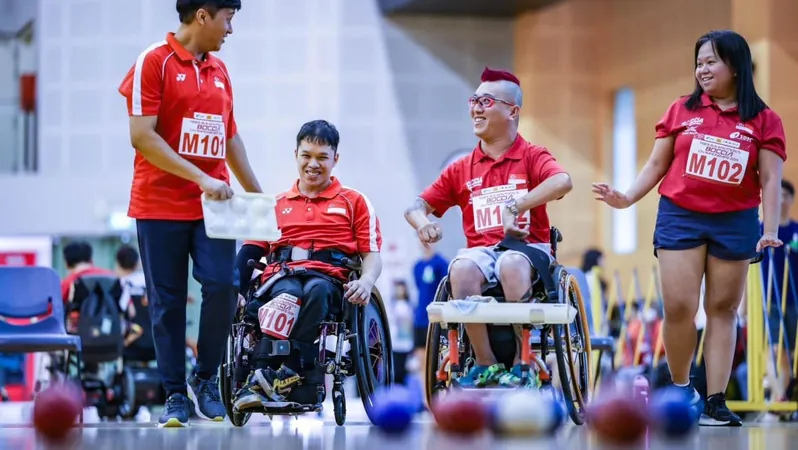
Major Initiative to Foster Disability Sports in Singapore Schools: A Game-Changer for Inclusion
2024-11-20
Author: Li
Introduction
In a groundbreaking move for inclusivity, Singapore is set to transform its mainstream education system by ensuring that all students experience disability sports within the next few years. This initiative is part of the revamped Disability Sport Master Plan (DSMP) aimed at enriching the lives of persons with disabilities through sports.
The Disability Sport Master Plan (DSMP)
The DSMP, which includes ten strategic moves, focuses not just on expanding sports opportunities for individuals with disabilities but also emphasizes community engagement and awareness. Minister for Culture, Community and Youth Edwin Tong highlighted the plan's broad vision to foster acceptance and understanding within society, stating, "Our vision today is to chart our next bound of inclusivity through sport, where more members of our disability community can be engaged, enriched, and empowered."
Honoring Sporting Heroes
At the recent Singapore Disability Sports Awards, Olympic and Paralympic heroes like Yip Pin Xiu and Toh Wei Soong were celebrated for their outstanding contributions to the sporting world. Since its launch in 2016, the DSMP has made significant strides; participation among persons with disabilities has jumped from 28% in 2015 to an impressive 46% last year.
Integrating Disability Sports in Schools
As part of this initiative, all mainstream schools will integrate disability-related programs aimed at promoting understanding and awareness of the challenges faced by disabled athletes. Currently, only about 30% to 35% of schools offer such programs, but the goal is to expand this to 100% by 2028. The programmes will be tailored to fit existing school structures and may include co-curricular activities, Values in Action experiences, and the Sports Education Programme (SEP).
Enabling Sports Fund and Community Hubs
In an exciting development, the government plans to launch the Enabling Sports Fund next year, contributing to a goal of raising S$10 million by 2030. This fund aims to stimulate impactful community-driven initiatives that promote disability sports across Singapore.
Moreover, to nurture aspiring para athletes, the government will establish Para Sports Community Hubs, with the first five locations set to launch by the end of this year. These hubs will specialize in various sports, including boccia, swimming, table tennis, and goalball, allowing individuals with disabilities to train and engage in competitive sports in their communities.
Focus on Accessibility
Accessibility is a central focus of this initiative. By 2030, all ActiveSG sports centres will feature "calm rooms” to accommodate individuals with sensitive sensory needs. Additionally, Singapore is committed to enhancing accessibility in sports facilities and increasing the number of trained coaches specializing in disability sports from 120 to 300 within the same timeframe.
Conclusion
The ministry's ultimate goal is to foster a cohesive society where everyone, regardless of ability, can participate in sports, thus enriching the community as a whole. Dr. Teo-Koh Sock Miang, president of the Singapore Disability Sports Council, reiterated that through sport, Singapore can build a more inclusive society that fosters empathy and enhances the quality of life for those with disabilities.
This ambitious initiative promises to be a game-changer not just for sports but for social inclusion in Singapore, making it clear that the future of sports is not only about competition but about creating a supportive and understanding environment for everyone.

 Brasil (PT)
Brasil (PT)
 Canada (EN)
Canada (EN)
 Chile (ES)
Chile (ES)
 España (ES)
España (ES)
 France (FR)
France (FR)
 Hong Kong (EN)
Hong Kong (EN)
 Italia (IT)
Italia (IT)
 日本 (JA)
日本 (JA)
 Magyarország (HU)
Magyarország (HU)
 Norge (NO)
Norge (NO)
 Polska (PL)
Polska (PL)
 Schweiz (DE)
Schweiz (DE)
 Singapore (EN)
Singapore (EN)
 Sverige (SV)
Sverige (SV)
 Suomi (FI)
Suomi (FI)
 Türkiye (TR)
Türkiye (TR)